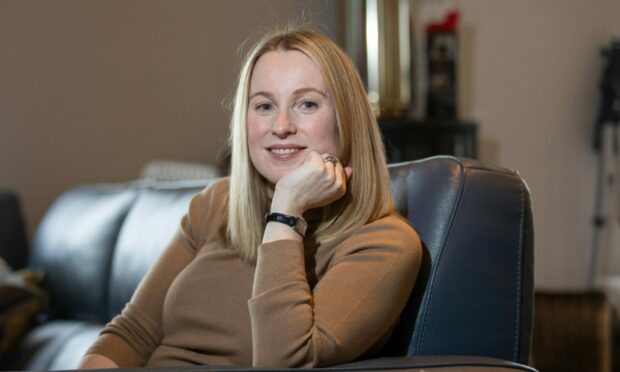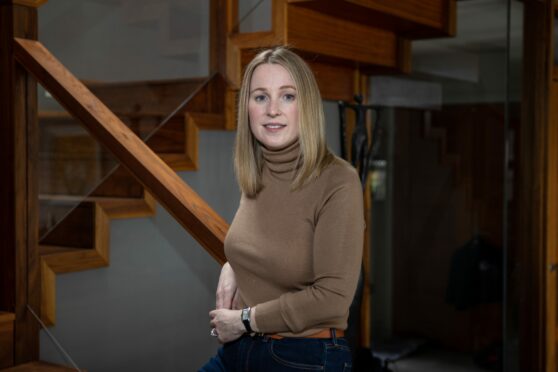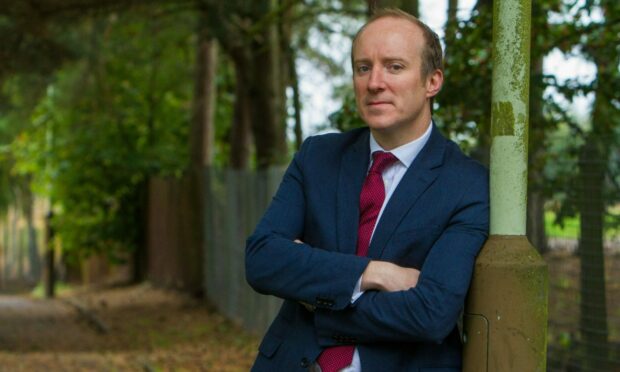An Angus mum is worried her children will be locked out of universities in Scotland because of the SNP government’s funding model.
Mum-of-three Caroline Gordon, who studied law at Dundee University, wants her children to be able to get the same opportunities as her when it comes to higher education.
However, she says the Scottish Government’s way of funding free university places for Scottish students – championed by the SNP – means there is effectively a “cap” on how many get accepted each year.
She is worried this will mean her children will be forced to apply for university places in England as a result.
Ms Gordon submitted a petition to the Scottish Parliament, urging the government to review how it funds university places to make sure it does not inadvertently discriminate against Scottish students.
‘Going to university changed my life’
Each year the Scottish Government sets how much funding it will provide to Scottish universities to cover free tuition fees.
More students from less affluent backgrounds are going to Scottish universities, in part thanks to a programme called ‘widening access’.
Statistics from the Scottish Funding Council show 16% of Scottish students at Scottish universities in 2022 came from the 20% most deprived areas of the country.
Ms Gordon says this way of setting funding, coupled with the increasing demand on the widening access programme, is leading to an artificial cap on how many Scottish students can go to university in Scotland.
She said: “What really resonates with me here is the idea that going to university changed my life and my outcomes.
“There are people who are working really hard but then find they can only go to university if they can afford to because they are being locked out of higher education.
“For example there was no one from Scotland who didn’t meet the widening access criteria on nine courses at Edinburgh University.”
It costs £1,820 for a Scottish student to study law at Edinburgh University if they did not get their fees covered by the government – but it would be £9,250 a year for those coming from elsewhere in the UK and £24,500 for international students.
‘All kids are being let down’
Ms Gordon, who lives in Carnoustie, said the way universities are funded is unfairly pitting children from privileged backgrounds against those from deprived backgrounds.
Since 2006 there has been an 84% increase in the number of Scottish applicants being refused a place at a Scottish university.
Ms Gordon said: “Supply has not increased with demand.
“If you take a step back, all kids are being let down by the current system.
“I am someone who has had a good career and been successful, and I am horrified that this might mean my kids are blocked out of education.
“We are now looking to send my kids elsewhere to get their education.”
She added: “Any kind of discrimination is horrible and I don’t want anyone feeling like there is not a place for them here.”
Education system ‘rigged’, says Marra
This is an issue Dundee-based MSP Michael Marra has raised with former first minister Nicola Sturgeon.
He said nearly 4,500 people have signed Ms Gordon’s petition because they feel the education system is “rigged” against their children.
The Labour MSP said: “There used to be a simple, fair deal in Scottish education – if you studied hard and got the right grades you got into university with the chance to build the future your hard work entitles you to.
“That deal is no longer available to ever growing numbers of young people across Scotland.”
He said the SNP’s business model imposed on universities is what has brought about this issue.
Mr Marra added: “For 14 years [the SNP] have refused to increase the rate paid to universities for educating Scottish students.
“The folly of that decision will only be exacerbated by current inflationary pressures to which the Scottish Government has singularly failed to respond.
“All of this leaves universities chasing students from overseas and across the world to pay the cost of teaching Scottish students.”
Centre-right think tank Reform Scotland also criticises the set-up. The group is running a campaign called “scrap the cap” to change what Ms Gordon says is an unfair funding model.
Lindsay Paterson, a member of the think tank’s commission on school reform, suggests graduates contribute to the cost of their education with a deferred fee, which is paid once they start to earn more than the average salary in Scotland.
She added: “The proceeds from the repaid fees would free up money to provide bursaries for entrants to university from low-income families.
“Such a system would ensure a ‘no win, no fee’ university education.”
Government defends its funding model
The Scottish Government says since 2006 the number of Scottish students going to Scottish universities has increased by 30% to over 33,000 in 2020-21.
A government spokesperson said: “Recent UCAS data shows a record number of 18-year-old Scots secured a place at our world class universities in 2022.
“Our commitment to free tuition means that, unlike elsewhere in the UK, Scottish-domiciled students studying in Scotland do not incur additional debt of up to £27,750, and average student loan debt in Scotland is the lowest in the UK.”
After criticism from Ms Gordon, a spokesman for Edinburgh University added it takes its commitment to widening access “very seriously”, but added: “The number of students we can accept from Scotland is capped by the Scottish Government, which means that applicants are only in competition with those who are also within their own fee pool, for example within Scotland.
“This means that the number of places for international students has no bearing on the number of places available to students from Scotland or the rest of the UK.”




Conversation